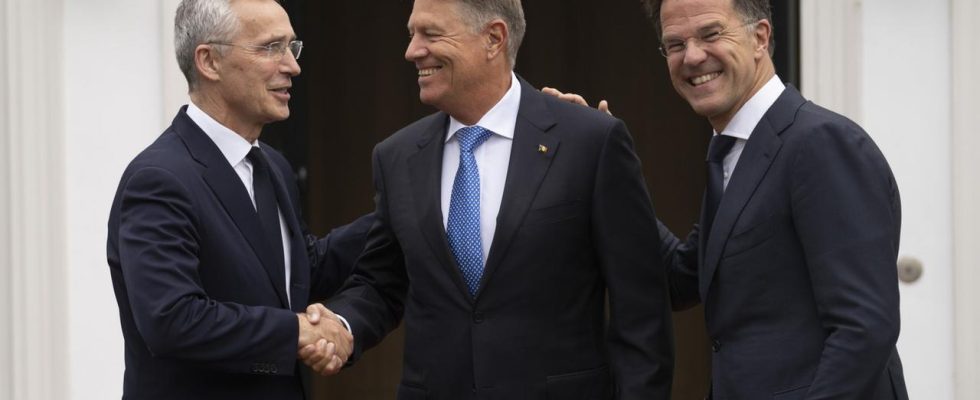The outgoing Dutch Prime Minister Rutte has unexpectedly faced competition in the fight for the NATO chief post. Romania’s President Iohannis is also applying. Who has the better cards?
It was perhaps a coincidence that Romanian President Klaus Iohannis was the first head of state to speak at this week’s nuclear summit in Brussels. In any case, the stage was large, heads of state and government from all over the world were sitting in the hall – and also his competitor, Mark Rutte, outgoing head of government of the Netherlands.
A good opportunity to take a fresh look at two politicians who are both aiming for the top spot in NATO. At first glance, Rutte and Iohannis are quite different. Rutte, who likes to act like a cheerful Dutchman who often rides his bike, has no family and has been at the head of the Dutch government longer than any other politician before him.
Iohannis, on the other hand, is a rather slow speaker, studied physics and, as he himself says, comes from a humble background in Transylvania. The 64-year-old has been at the helm of Romania for ten years now. So he also knows how to secure power.
When applying, he said: “In the face of the ongoing threat from Russia, Romania could contribute to a new vision.” However, what this should look like remains vague. Some NATO states would certainly have sympathy for a Secretary General from Eastern Europe. Hungary, for example, Turkey has not yet decided.
The “big four” have made their decision
In Berlin, Paris, London and Washington, however, people are clearly in favor of Rutte. And the USA has the final say on this personnel, says Max Bergmann, NATO expert at the Center for Strategic and International Studies (CSIS) in Washington. What speaks for the Dutchman from his point of view: “Mark Rutte has shown that he is a good candidate. He can bring countries together and reach an agreement, that’s important.”
The USA is also worried that with an Eastern European at the head of NATO everything will only revolve around Russia. But there are also other threats, for example in North Africa, says Bergmann.
Romanian President Iohannis is taking advantage of the fact that there is grumbling among Eastern Europeans because they have so far been ignored for important positions in the EU and NATO. And so his application may also be tactical in the calculation that if things don’t work out with NATO, he will have to be offered another top position.
Every joint appearance by Iohannis (right) and Rutte (2nd from right) is now viewed from the perspective of competition for Stoltenberg’s successor – including at the nuclear energy summit in Brussels.
The Trump factor
But now it’s about NATO. Both applicants meet important requirements: You have to have been head of government at some point in order to negotiate on an equal footing with the other 32 heavyweights about money, weapons and nuclear deterrence. And perhaps the most powerful man among them, the US President, could soon be called Donald Trump again. Both candidates have met him before.
[In der NATO gilt Rutte als “Trump-Flüsterer”, seit es ihm 2018 auf einem NATO-Gipfel in einer Diskussion über Verteidigungsausgaben gelang, einen wütenden Trump zu beruhigen. Dabei hatte die niederländische Regierung unter Rutte selbst immer wieder das NATO-Ziel verpasst, zwei Prozent des Haushaltes für Verteidigung auszugeben. Andererseits tragen ihm Ungarn und die Türkei Reibereien aus der Zeit nach, als die NATO um den Beitritt Schwedens rang.]
However, Rutte’s record as head of government is not flawless. He was forced to resign because his government falsely accused families of welfare fraud. A comparatively small dispute over asylum policy that cost him his government position last year. He then announced his retirement from politics. The right-wing populist Geert Wilders then won the new election.
Who can Iohannis convince?
Iohannis, according to the country’s media, is not one to rush into an adventure and had already held discussions before his candidacy. It is uncertain whether that will be enough for a successful candidacy. To do this, he would have to get a substantial number of other states on his side, and there are no signs of that happening yet.
So Rutte can hardly be denied the role of favorite. He knows them all and is the longest-serving head of government in the EU after Viktor Orban. He also gave the Netherlands an influential voice in Europe.
Iohannis, on the other hand, remains an outsider candidate. But in Europe we have heard the signal from Eastern Europeans that they would also like to have a top position in the future. After the European elections in June, some will be replaced.

